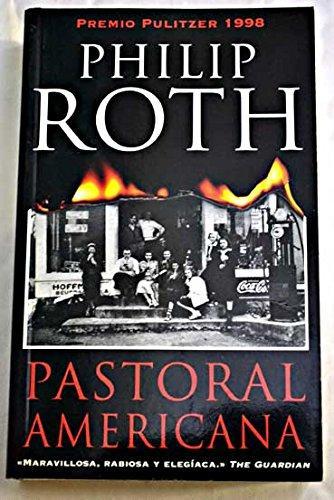560, pagine
lingua Spanish
Pubblicato il 08 Ottobre 2002

560, pagine
lingua Spanish
Pubblicato il 08 Ottobre 2002
American Pastoral is a Philip Roth novel published in 1997 concerning Seymour "Swede" Levov, a successful Jewish American businessman and former high school star athlete from Newark, New Jersey. Levov's happy and conventional upper middle class life is ruined by the domestic social and political turmoil of the 1960s during the presidency of Lyndon B. Johnson, which in the novel is described as a manifestation of the "indigenous American berserk". The framing device in American Pastoral is a 45th high school reunion attended by frequent Roth alter ego Nathan Zuckerman, who is the narrator. At the reunion, in 1995, Zuckerman meets former classmate Jerry Levov who describes to him the tragic derailment of the life of his recently deceased older brother, Seymour "Swede" Levov. After Seymour's teenage daughter Merry, in 1968, set off a bomb in protest against American involvement in the Vietnam War, killing a bystander, and subsequently went …
American Pastoral is a Philip Roth novel published in 1997 concerning Seymour "Swede" Levov, a successful Jewish American businessman and former high school star athlete from Newark, New Jersey. Levov's happy and conventional upper middle class life is ruined by the domestic social and political turmoil of the 1960s during the presidency of Lyndon B. Johnson, which in the novel is described as a manifestation of the "indigenous American berserk". The framing device in American Pastoral is a 45th high school reunion attended by frequent Roth alter ego Nathan Zuckerman, who is the narrator. At the reunion, in 1995, Zuckerman meets former classmate Jerry Levov who describes to him the tragic derailment of the life of his recently deceased older brother, Seymour "Swede" Levov. After Seymour's teenage daughter Merry, in 1968, set off a bomb in protest against American involvement in the Vietnam War, killing a bystander, and subsequently went into hiding, Seymour remained traumatized for the rest of his life. The rest of the novel consists of Zuckerman's posthumous recreation of Seymour's life, based on Jerry's revelation, a few newspaper clippings, and Zuckerman's own impressions after two brief run-ins with "the Swede." In these encounters, which take place early in the novel, Zuckerman learns that Seymour has remarried and has three young sons, but Seymour's daughter Merry is never mentioned. In Zuckerman's reimagining of Seymour's life, this second marriage has no part; it ends in 1973 with Watergate unraveling on TV while the previous lives of the protagonists completely disintegrate. American Pastoral won the Pulitzer Prize in 1998. Seven years later, the novel was included in Time's List of the 100 Best Novels, a list covering the period between 1923 and 2005. The film rights to it were later optioned, though a film version was not made until 2016. In 2006, it was one of the runners-up to Toni Morrison's Beloved, in the "What is the Best Work of American Fiction of the Last 25 Years?" contest held by the New York Times Book Review. After Roth's passing, The New York Times asked several prominent writers to pick their favorite work by Roth, and many picked American Pastoral. Richard Ford, in his response, wrote: "The fusing powers of Roth’s imagination, conviction and raging intelligence are everywhere evident and exhilarating. There is about it a profound and heartening sense (and it is a profound book) that the verbal construction you’re undertaking as a reader represents absolutely the only way this mighty story could ever be brought into existence. American Pastoral stares back at me audaciously unblinking as a great novel. And although such a rambunctious piece of artifice can inevitably not be perfect, it is nonetheless in all its ways right." Stephen King wrote: "American Pastoral is one of the five best novels I have ever read, maybe the best. It is muscular storytelling complemented by characters — especially Swede Levov — who burn their way into one’s memory. The scope is relatively small, but the ambition is epic. Few can handle the passing years as well as Roth does here. It ranks with the greatest of American fiction."